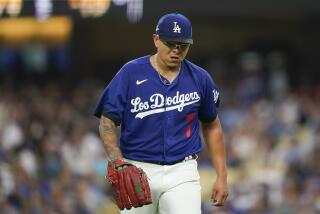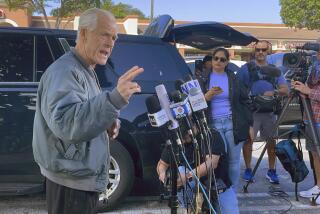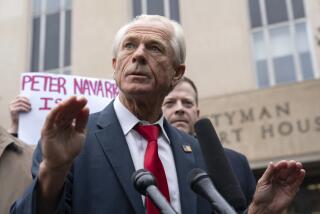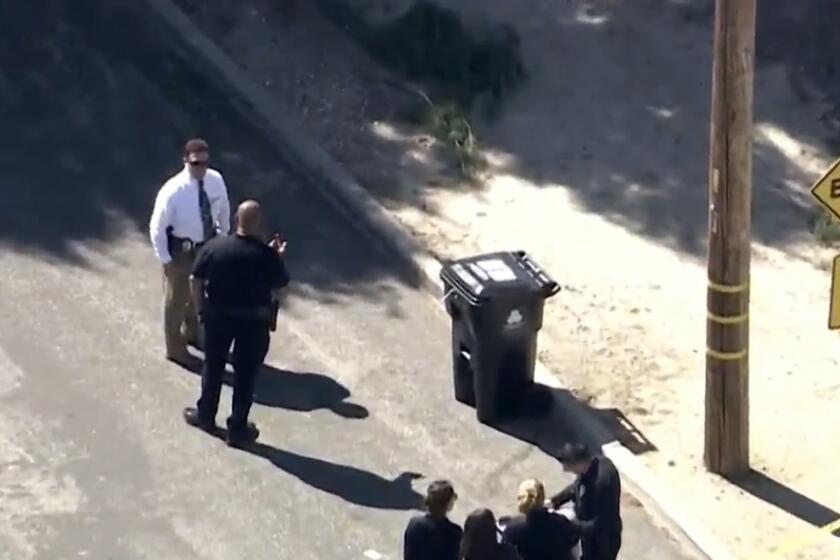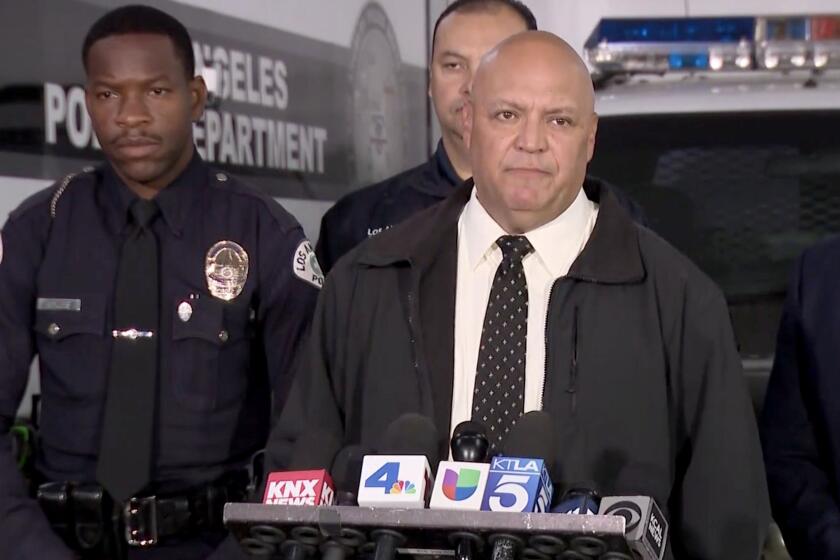Barry Bonds avoids prison, gets house arrest and probation
A federal judge Friday sentenced baseball slugger Barry Bonds to probation, 30 days’ confinement in his Beverly Hills home and community service, but put the sentence on hold pending Bonds’ appeal of his felony obstruction of justice conviction.
U.S. District Judge Susan Illston, who presided over Bonds’ perjury trial, said “the jury got it exactly right” when it convicted Bonds in April for evasive testimony to a federal grand jury investigating doping in professional sports.
“Mr. Bonds made an effort to obstruct justice here,” Illston said, but “he didn’t manage to succeed.”
She added that the government investigation changed the sports world by launching new testing programs and transforming public attitudes.
Prosecutors urged Illston to “send a message” by sending the former San Francisco Giants star to prison.
In addition to home confinement, Bonds, 47, was sentenced to two years’ probation, ordered to perform 250 hours community service in youth-related activities and pay a $4,000 fine.
Assistant U.S. Atty. Matthew A. Parrella called the sentence “a slap on the wrist” and derided the fine as “almost laughable. “
For a man with a mansion, Parrella told the court, home detention was “simply no deterrence.”
Illston followed the recommendations of a federal probation officer who reviewed the case. She said she was impressed by Bonds’ charitable activities, both in time and money, over decades.
“The thing that was striking to me was that most of that was done out of the public eye and privately,” the judge said.
Bonds, who holds the all-time record for most home runs, listened without visible emotion to the proceedings but declined an offer to address the court. He smiled and thanked fans later as he left the courthouse.
The conviction could cost Bonds a place in baseball’s Hall of Fame, experts have said.
Prosecutors charged Bonds with three counts of perjury in addition to obstruction of justice for his 2003 testimony to a grand jury investigating BALCO, the Burlingame-based Bay Area Laboratory Co-Operative, which was selling banned steroids and other performance-enhancing drugs to the nation’s top athletes. Bonds testified he had not knowingly taken performance-enhancing drugs.
After a 12-day trial in April, jurors deadlocked on the perjury charges and convicted Bonds of obstruction on the grounds that he gave a rambling, evasive answer to a question.
Bonds’ lawyers are appealing that conviction, which they estimated could take 17 months. If the appeal fails, Bonds would then start serving his sentence.
Parrella told the court that Bonds’ testimony before the grand jury reflected a long pattern of deceit.
“The defendant lived basically a double life for decades before this,” the prosecutor said. “He was well-versed in misleading people. He had mistresses throughout his entire married life, through two marriages.”
When Illston reminded Parrella that Bonds wasn’t convicted of adultery, someone in the courtroom cheered.
Parrella also argued that Bonds planned to give false testimony and has shown no remorse.
“This was not a spur-of-the-moment thing where Bonds got a subpoena on Monday, showed up on Tuesday and told an ill advised story…” Parrella said. “This a story he told for decades before he went into the grand jury.”
Bonds’ lawyers said no court has ever upheld an obstruction conviction based on the kinds of testimony Bonds gave, but Parrella said he was confident the conviction would stand.
Prosecutors agreed “without prejudice” to dismiss the deadlocked counts, which reserved the government’s right to charge Bonds again for the same offenses. Legal analysts said that was a face-saving gesture and predicted confidently that Bonds would never be recharged on those counts.
University of San Francisco law professor Robert Talbot, who followed the case, said it was “standard” to postpone enforcing a sentence pending an appeal if the defendant was neither a danger nor a flight risk.
Although Bonds got less home detention time than that given to others convicted of lying in the doping probe, the community service would probably “do a lot of good” and the sentence “made sense,” Talbot said.
But he said he was struck by the disparity between Bonds’ sentence and the year Greg Anderson, Bonds’ former trainer, served in federal prison for refusing to testify against the home run king.
Another baseball legend, pitcher Roger Clemens, will go to trial in April on perjury charges involving sports doping. Clemens’ first trial ended after only two days when prosecutors introduced banned evidence.
The jury, considered favorable to the defense, had to be dismissed. A judge in the case later ruled the prosecution’s error had been unintentional.
More to Read
Start your day right
Sign up for Essential California for news, features and recommendations from the L.A. Times and beyond in your inbox six days a week.
You may occasionally receive promotional content from the Los Angeles Times.
